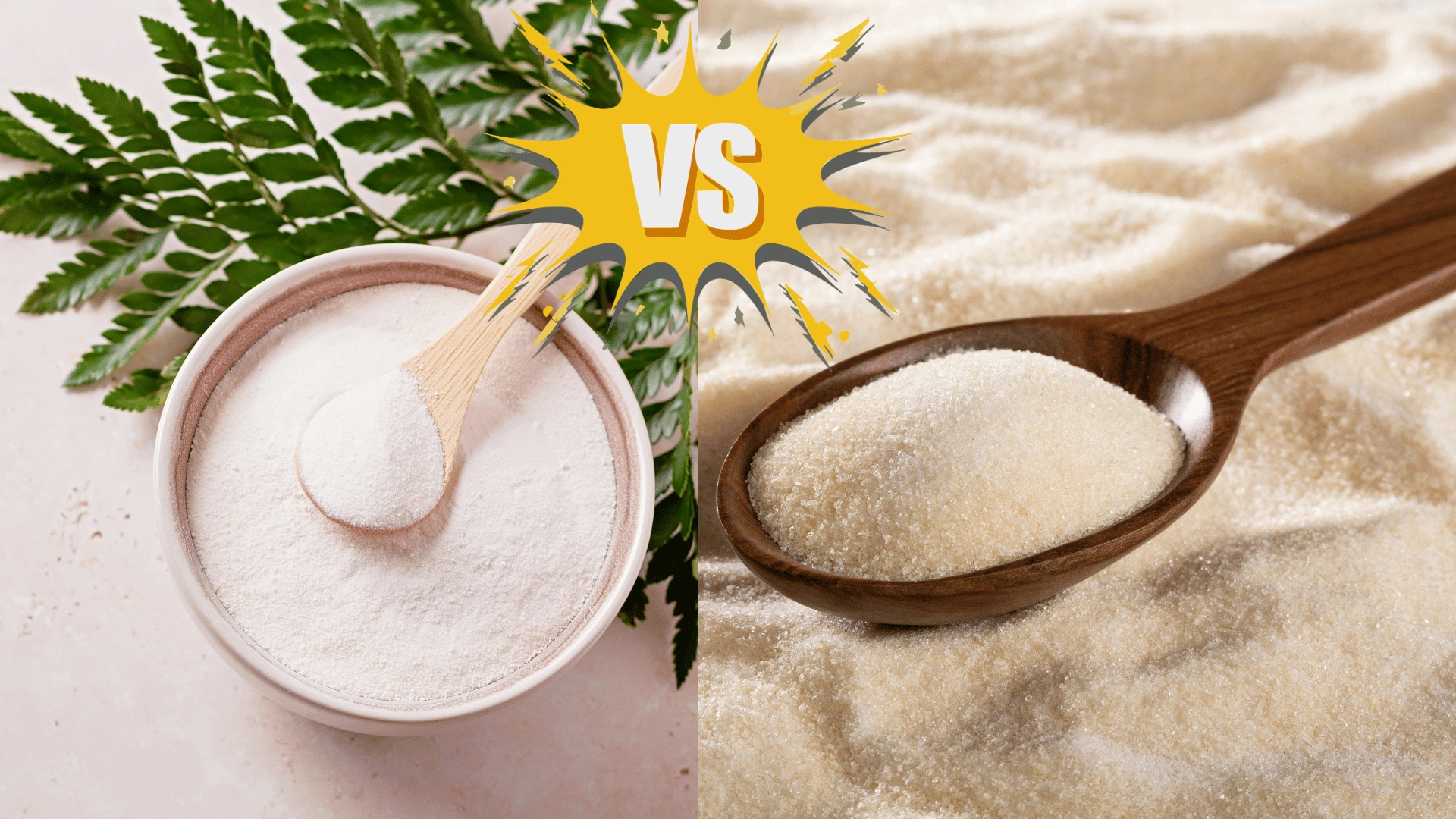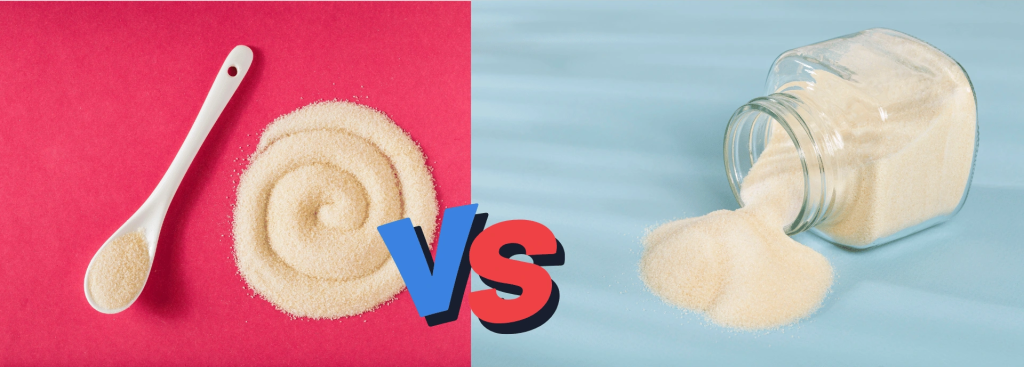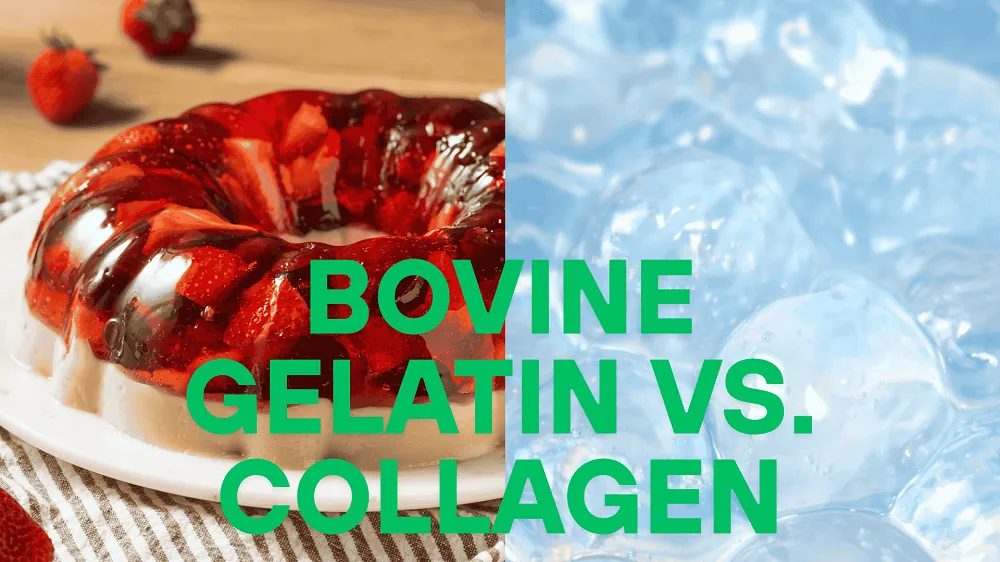Have you ever wondered why some people seem to age like fine wine while others… well, not so much? The secret might just be hiding in plain sight – or rather, right beneath our skin. I’m talking about collagen, folks! It’s the unsung hero of our body’s structural support system, and lately, it’s been causing quite a stir in the health and beauty world. But here’s the kicker: not all collagen supplements are created equal. Today, we’re diving deep into the collagen pool to explore the difference between collagen and collagen peptides. Buckle up, because this is going to be one heck of a ride!

If you don’t want to scroll through too much content, you can also jump directly to the Collagen vs Collagen Peptides table to give you a clear comparison Collagen-vs-Collagen-Peptides-table
The Collagen Conundrum: What’s All the Fuss About?
Let’s start by unraveling the mystery of collagen itself. Imagine your body as a magnificent skyscraper. Now, collagen? It’s the steel framework holding everything together. This superhero protein makes up a whopping 30% of the total protein in our bodies, playing a starring role in our skin, bones, muscles, tendons, and even blood vessels. It’s the unsung hero keeping us from turning into human puddles!
But here’s where the plot thickens. As we age, our body’s collagen production starts to slow down. It’s like our internal collagen factory decides to switch from full-time to part-time work. The result? Well, it’s not pretty. We’re talking wrinkles deeper than philosophical conversations, joints creakier than an old rocking chair, and skin saggier than a basset hound’s jowls.
Now, you might be thinking, “No problem! I’ll just load up on collagen-rich foods like bone broth and pig’s feet!” (Yum?) While that’s a valiant effort, here’s the kicker: the collagen in our food gets broken down during digestion. It’s like trying to mail a fully assembled bicycle – it’s just not going to arrive in one piece. That’s where collagen supplements come in, promising to deliver collagen in a form our bodies can actually use. But not all collagen supplements are created equal, which brings us to our main event: Collagen vs Collagen Peptides!
Collagen vs Collagen Peptides: The Showdown
Picture this: In one corner, we have Native Collagen, the heavyweight champion. In the other corner, the challenger, Collagen Peptides. Let’s break down these contenders:
Native Collagen: The OG
Native collagen, often referred to as “primal collagen,” is like the wise old grandpa of the protein world. It’s the full-length collagen molecule, just as nature intended. If you could shrink yourself down and take a stroll through your body’s collagen structures, this is what you’d see. It’s big, it’s complex, and it’s got a rich history.
But here’s the catch: when it comes to supplements, native collagen is like trying to fit a camel through the eye of a needle. Its large, complex structure makes it difficult for our bodies to absorb and utilize effectively. It’s like trying to swallow a watermelon whole – not impossible, but definitely not efficient.
Collagen Peptides: The New Kid on the Block
Enter collagen peptides, also known as hydrolyzed collagen. If native collagen is the wise old grandpa, collagen peptides are the cool, efficient grandkids who know how to use smartphones. These are essentially collagen molecules that have been broken down into smaller pieces through a process called hydrolysis.
Think of it like this: If native collagen is a long string of Christmas lights all tangled up, collagen peptides are those same lights neatly separated and ready to plug in. This pre-breakdown process makes collagen peptides much easier for our bodies to absorb and put to use. It’s like the difference between trying to eat a whole cow versus enjoying a nicely prepared steak – both are beef, but one is a lot easier to digest!
The science backs this up too. A study published in the Journal of Agricultural and Food Chemistry found that collagen peptides were absorbed more efficiently than native collagen. It’s like they have a fast-pass to get into the body’s theme park!
The Benefits: More Than Just Skin Deep
Now that we’ve met our protein protagonists, let’s talk about what they can do for you. Spoiler alert: it’s not just about looking good (although that’s definitely a perk!).
Turning Back the Clock on Your Skin
Let’s face it, we all want to age like fine wine, not milk left out in the sun. Collagen, particularly collagen peptides, might just be your ticket to the fountain of youth. A study published in the Journal of Medical Nutrition & Nutraceuticals found that women who took collagen peptides for 8 weeks saw significant improvement in skin elasticity compared to those who took a placebo.
But what does this mean in real terms? Imagine your skin as a trampoline. Young skin is like a brand new trampoline – bouncy, tight, and resilient. As we age and lose collagen, that trampoline starts to sag and lose its bounce. Collagen peptides help to tighten up that trampoline, giving your skin back some of its youthful bounce and glow. It’s like giving your skin a time machine, minus the risk of accidentally becoming your own grandparent!
Saying Goodbye to Achy Joints
Remember when you could spring out of bed in the morning without sounding like a symphony of creaks and groans? Collagen might help you recapture some of that sprightly spirit. Research published in the International Journal of Medical Sciences showed that athletes who took collagen peptides experienced less joint pain.
Think of your joints like the hinges on a door. When they’re well-oiled, the door swings open and shut smoothly and silently. But as those hinges wear down, you start to get creaks, stiffness, and that annoying squeak that makes you wince every time you open the door. Collagen peptides are like WD-40 for your joints, helping to lubricate and cushion them so you can move more freely and with less pain. It’s not quite the same as having the joints of a 20-year-old, but it’s a whole lot better than feeling like the Tin Man before his oil can!
Gut Health: The Unexpected Hero
Here’s a plot twist worthy of M. Night Shyamalan – collagen might be great for your gut too! A study in the Journal of Clinical Nutrition found that patients with inflammatory bowel disease had lower serum concentrations of collagen. While more research is needed, it’s an exciting area to watch.
Think of your gut lining like the walls of your house. You want them to be strong and intact, keeping the good stuff in and the bad stuff out. Collagen helps maintain and repair this crucial barrier. It’s like having a team of tiny construction workers constantly patching up and reinforcing your gut walls. This could potentially help with issues like leaky gut syndrome and improve overall digestive health. Who knew that the same stuff keeping your skin plump could also be keeping your tummy happy?
Sports Nutrition
Collagen powder has gained popularity in sports nutrition due to its potential to support joint health and muscle recovery. Athletes and fitness enthusiasts often incorporate collagen into their supplement regimen to support overall performance and recovery.
Pumping Up Your Workout
Attention, gym rats and fitness enthusiasts! Before you chug another protein shake, you might want to consider adding some collagen to the mix. A study in the British Journal of Nutrition found that collagen peptide supplementation, in combination with resistance training, improved body composition and muscle strength in older men.
Imagine your muscles as a brick wall. Protein is the bricks, crucial for building the structure. But collagen? That’s the mortar holding everything together. It helps support and strengthen the connective tissues surrounding your muscles, potentially reducing injury risk and improving recovery times. It’s like giving your muscles a suit of armor to wear while they battle those weights. And the best part? This benefit isn’t just for the young bucks. Even if you’re closer to getting a senior discount than a student one, collagen can still help you build and maintain muscle mass. Who says you can’t teach an old dog new tricks?
Choosing Your Collagen Champion
So, you’re convinced that collagen is the way to go. But how do you choose between native collagen and collagen peptides? While both have their merits, collagen peptides often come out on top due to their better absorption. It’s like choosing between a rowboat and a speedboat to cross a lake – both will get you there, but one’s going to do it a lot more efficiently.
When choosing a supplement, look for ones that contain Types I and III collagen for skin health, or Type II for joint health. And always, always check the source. Marine collagen, for example, has been shown to have excellent bioavailability. It’s like the Usain Bolt of the collagen world – fast, efficient, and impressive.
But don’t just grab the first collagen supplement you see. Look for products that have been third-party tested for purity and potency. It’s like buying a car – you want to check under the hood and take it for a test drive before committing. And remember, more expensive doesn’t always mean better. It’s about finding a high-quality product that fits your needs and
Incorporating Collagen into Your Life: A How-To Guide
Now that you’re a collagen connoisseur, you might be wondering, “Okay, I’m sold. But how do I actually use this stuff?” Great question! The beauty of collagen supplements, especially collagen peptides, is their versatility. They’re like the chameleons of the supplement world, blending seamlessly into almost anything.
You can mix collagen peptides into your morning coffee for a protein-packed pick-me-up. It’s virtually tasteless, so you won’t even know it’s there (except for the extra spring in your step!). Prefer smoothies? Toss a scoop into your blender along with your favorite fruits and veggies. You can even get creative and use collagen in baking – collagen pancakes, anyone?
As for when to take it, there’s no one-size-fits-all answer. Some people swear by taking it first thing in the morning, claiming it helps them start their day on the right foot. Others prefer it before bed, believing it supports overnight repair and regeneration. The truth is, the best time is whenever you’ll remember to take it consistently. It’s like exercise – the best routine is the one you’ll actually stick to.
Just remember, consistency is key. Most studies on collagen supplementation used daily doses for several weeks or months. It’s not a magical overnight solution, but rather a long-term investment in your health. Think of it like saving for retirement – small, consistent contributions add up to big results over time.
Conclusion
In the debate of collagen vs collagen peptides, both forms offer potential benefits for skin health, joint support, and overall well-being. Collagen peptides may have an edge in terms of absorption and bioavailability, but whole collagen supplements can still be effective.
When choosing between collagen peptides vs collagen powder, consider your specific health goals, any dietary restrictions, and personal preferences. Remember that while collagen supplements can be a valuable addition to your health regimen, they work best when combined with a balanced diet, regular exercise, and a healthy lifestyle.
As with any supplement, it’s crucial to purchase from reputable sources and consult with a healthcare professional before starting a new supplement regimen. By making an informed decision, you can harness the potential benefits of collagen supplementation and support your body’s natural collagen production for healthier skin, joints, and overall wellness.
Collagen vs Collagen Peptides table
| Feature | Collagen | Collagen Peptides |
|---|---|---|
| Molecular Size | Larger molecules | Smaller, broken-down molecules |
| Absorption | Less easily absorbed | More easily absorbed |
| Bioavailability | Lower | Higher |
| Digestion | May require more digestive effort | Easier to digest |
| Onset of Effects | May take longer to see results | Potentially faster results |
| Versatility in Products | Used in some supplements and skincare | Widely used in supplements, beverages, and skincare |
| Taste | May have a more noticeable taste | Often tasteless and easier to mix |
| Primary Benefits | Skin, hair, nails, joints | Skin, hair, nails, joints, potentially more targeted effects |
| Cost | Generally less expensive | Often more expensive due to processing |
| Best For | General supplementation | Targeted supplementation, faster results |
Is it good to take collagen every day?
For most people, taking collagen daily is considered safe and may provide cumulative benefits over time. However, as with any supplement, it’s important to follow recommended dosages and consult with a healthcare provider, especially if you have any pre-existing health conditions or are taking medications.
Who should not take collagen peptides?
Pregnant women, those with kidney issues, and individuals with allergies to collagen sources should avoid or consult a doctor before taking collagen peptides.
Which collagen does Jennifer Aniston use?
Jennifer Aniston has been associated with Vital Proteins collagen products.
What to avoid when taking collagen?
Avoid taking with high-sugar foods, hot drinks, or other protein supplements.and overall appearance with regular use of collagen peptides.
What are the benefits of collagen for women?
Potential benefits include improved skin elasticity, stronger nails, healthier hair, and support for bone and joint health.
What is the difference between collagen and hydrolyzed collagen?
Collagen refers to the intact protein molecule, while hydrolyzed collagen (also known as collagen peptides) has been broken down into smaller, more easily absorbable peptides. Hydrolyzed collagen is typically more bioavailable and easier for the body to use.
What are the best collagen supplements?
Highly rated collagen supplements include those from Vital Proteins, Ancient Nutrition, and Orgain, among others.
What are the side effects of collagen powder?
Common side effects may include digestive discomfort, bloating, and potential allergic reactions in some individuals.
Can I take collagen during pregnancy?
While collagen is generally considered safe, it’s always advisable for pregnant women to consult with their healthcare provider before starting any new supplement regimen. Some studies suggest that collagen may support skin elasticity and joint health during pregnancy, but more research is needed to confirm its safety and efficacy for pregnant women.
what type of collagen causes breast cancer?
It’s important to clarify that collagen itself does not cause breast cancer. However, some studies have shown that certain types of collagen in the extracellular matrix may play a role in cancer progression. This is related to the body’s own collagen production and structure, not supplemental collagen. There is no evidence suggesting that taking collagen supplements increases cancer risk.



